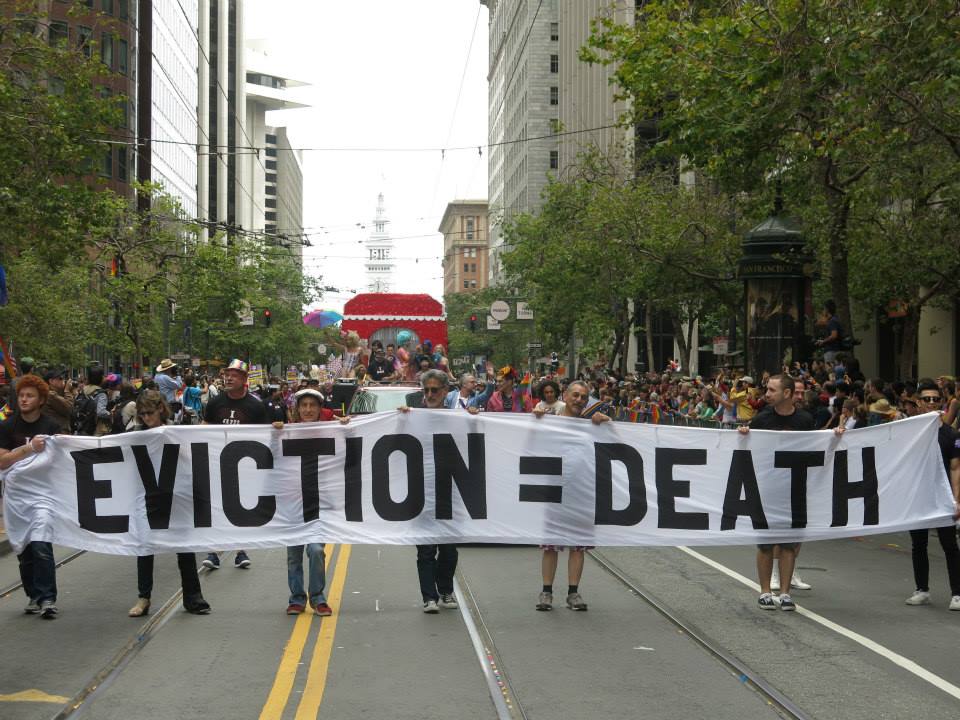Speculators who evict tenants under the Ellis Act in San Francisco are seeing staggering profits, and paying only a tiny fraction of that money to help the victims relocate, a new city study shows.
In some cases, the value of Ellised properties have increase by more than 400 percent, and the average profit from selling the vacated units is $429,000, the report by the city’s Budget and Legislative Analyst shows.

Only 5.2 percent of that money goes to relocation fees and expenses to displaced tenants, the data, which covers the past ten years, shows.
The report shows the need to significantly increase the modest relocation fees that landlords have to pay tenants who are evicted under the Ellis Act, Sup. Myrna Melgar, who asked for the report, told me.
“That’s what we’re looking at,” she said.
The Ellis Act, one of the most abused state tenant laws, allows landlords to throw all of their renters out in the name of “going out of business.” Then they can sell the vacant buildings as tenancies in common, the rough equivalent of condos.
Most of these evictions don’t involve longtime landlords who are tired of managing rental property. In the vast majority of San Francisco cases, speculators buy apartment buildings with longtime tenants under rent control, cite the Ellis Act to evict everyone, then flip the building for a quick profit.
Under current local law, the evictors are required to pay $7,419 to each tenant, up to a maximum of $22,257 for a household. That, the report says, is just 5.2 percent of the profit that the typical speculator makes on the deal.
More: The relocation costs aren’t even enough to cover first-and-last month’s rent on a new apartment:
The required relocation payments for a single tenant in a 1 bedroom unit moving to a market rate 1 bedroom unit would not be sufficient to cover first and last months’ rent, a security deposit (one month’s rent), moving costs, and lost wages for five days spent packing and moving (conservatively assuming a minimum wage job in San Francisco). We estimate the deficiency in such a scenario to be $2,470 based on a relocation payment of $7,419 and relocation costs of $9,889.
The BLA examined 59 properties, representing 135 housing units, over the period of 2011-2021.
We found that the median assessed value of … such properties … increased by 464.5 percent from $299,470 in FY 2011- 12 to $1,690,650 in FY 2020-21, or by approximately $1.4 million. This rate of increase exceeds the 223.4 percent increase in assessed value for all properties for which Ellis Act Withdrawal Petitions were filed during that same period (which includes those that were not sold after the Ellis Act Withdrawal Petition was filed). It also exceeds the increase in all home values in San Francisco of approximately 116 percent between 2011 and 2021 as reported by Zillow. All of this data indicates that evicting tenants through the Ellis Act corresponds to increased value of the properties, particularly if they are sold, but even if they are not.
More:
Finally, we further analyzed the financial impacts of Ellis Act evictions by analyzing the change in sales price for just those properties for which the owners filed an Ellis Act Withdrawal Petition and subsequently sold the property. Comparing the most recent sales prices prior to the Ellis Act Withdrawal Petition with the sales price after the Ellis Act Withdrawal Petition was filed for 38 properties representing 73 housing units, we found a median change in price of $949,688 for all properties, or $429,000 per unit.
This is pretty dramatic information, and it shows why so many speculators want to buy buildings in San Francisco and evict all the tenants: The profits are giant.
In 2014, then-Sup David Campos introduced a bill to raise the relocation fees; under his proposal, an evictor would have to pay tenants the difference between their current rent and market rent on a similar apartment for two years.
(The federal standard for people forced to move when the government wants to, say, build a freeway, includes that same level of payment for four years.)
Then-Sup. London Breed tried to derail it, but it wound up passing the full board.
A right-wing property-rights group sued in federal court, and Judge Charles Breyer struck it down.
The city decided not to appeal.
So now it’s going to be up to Melgar, her colleagues, and the city attorney to figure out a way to use the data in the BLA report to craft legislation raising the relocation fees in a way that will pass court muster.





